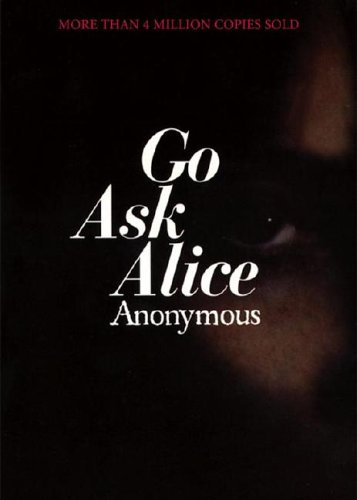
This month, for Barrie Summy's Book Review Club, I'm writing about Go Ask Alice by "Anonymous."
September 26−October 3, 2009 is the American Library Association's Banned Books Week. I'm not a big fan of public book banning, so I decided to choose a banned book and review it this week.
I read Go Ask Alice only once, way back when I was in Junior High. Since then, I don't think I've ever really talked about it with anybody but I still think about this novel frequently.
Amazon Product Description:
It started when she was served a soft drink laced with LSD in a dangerous party game. Within months, she was hooked, trapped in a downward spiral that took her from her comfortable home and loving family to the mean streets of an unforgiving city. It was a journey that would rob her of her innocence, her youth -- and ultimately her life.
Read her diary.
Enter her world.
You will never forget her.
For thirty-five years, the acclaimed, bestselling first-person account of a teenage girl's harrowing decent into the nightmarish world of drugs has left an indelible mark on generations of teen readers. As powerful -- and as timely -- today as ever, Go Ask Alice remains the definitive book on the horrors of addiction.
Look, I know it turns out the book was written by an adult anti-drug activist rather than an actual teenage girl (but who really thought this was a memoir?!) and perhaps some of the message is a bit heavy handed. But I didn't notice that when I read the book as a kid.
I have never tried drugs. Most people I know have done a little (or a lot) of experimenting. And many, though not all, of them enjoyed themselves and survived unscathed. But I haven't ever experimented, and I credit much of that to my reading this book at just the right time in my life. What if what if what if . . . everything goes wrong?
There's so little we can control in this life, I feel like I need to measure every significant risk. What can I gain? What can I lose? Maybe I'd have a really great time stoned out of my mind. But my mind isn't such a terrible place to be. And maybe I'd end up like Alice.
How ironic that parents refuse to let their teens read this book because it's so graphic. That's the point! It wouldn't be very scary or convincing if it depicted drugs as a relatively harmless diversion, or, worse, didn't mention drugs at all.
There are monsters under the bed, and while we need to protect our children's innocence when they're very young, we also need to prepare our children for the world in which they live.
*
With materials accused of being pornography censors have to decide if the content is intended primarily to titillate or if it serves a larger artistic aesthetic. So too it is with these books, each of which depicts something unpleasant. Should we only publish books about pleasant topics where nothing ugly happens? Fie. What greater sin than white-washing the past? We can't and shouldn't try to revise history. Nor should we attempt to make all the world's tumors into lumps of peanut butter chocolate chip cookie dough.
The ugliness in these novels is informative, educational, and artistic. It is not intended to shock and titillate as much as to illustrate and illuminate. Revealing warts-and-all is how these books teach.
A few recently banned books that struck me:
Anonymous. GO ASK ALICE. Avon; Prentice-Hall. Challenged as a reading assignment at Hanahan Middle School in Berkeley County, S.C. (2008) because of blatant, explicit language using street terms for sex, talk of worms eating body parts, and blasphemy. The anonymously written 1971 book is about a fifteen-year-old girl who gets caught up in a life of drugs and sex before dying from an overdose. Its explicit references to drugs and sex have been controversial since it was first published. Source: May 2008, pp. 98-99.
Hosseini, Khaled. THE KITE RUNNER. Bloomsbury. Challenged as appropriate study in tenth-grade honors English class at Freedom High School in Morganton, N.C. (2008) because the novel depicts a sodomy rape in graphic detail and uses vulgar language. Source: May 2008, pp. 97-98.
Lee, Harper. TO KILL A MOCKINGBIRD. Lippincott/Harper; Popular Library. Retained in the English curriculum by the Cherry Hill, N.J. Board of Education (2007). A resident had objected to the novel's depiction of how blacks are treated by members of a racist white community in an Alabama town during the Depression. The resident feared the book would upset black children reading it. Source: Mar. 2008, p. 80; May 2008, pp. 117-18.
Twain, Mark [Samuel L. Clemens]. THE ADVENTURES OF HUCKLEBERRY FINN. Bantam; Bobbs-Merrill; Grosset; Harper; Holt; Houghton; Longman; Macmillan; NAL; Norton; Penguin; Pocket Bks. Challenged, but retained in the Lakeville, Minn. High School (2007) and St. Louis Park High School in Minneapolis, Minn. (2007) as required reading for sophomores. The district will conduct staff training about race issues and revise the way it weighs requests for curriculum changes. The district will also let its staff offer alternative assignments on racially sensitive issues in ways which “students do not feel ostracized because they have opted out of the assignment." Challenged at Richland High School in North Richland Hills, Tex. (2007) because of racial epithets. Challenged at the Manchester, Conn. High School (2007) "because the 'N' word is used in the book 212 times." Source: May 2007, p. 99; July 2007.
Click icon for more
book review blogs
@Barrie Summy
book review blogs
@Barrie Summy

No comments:
Post a Comment